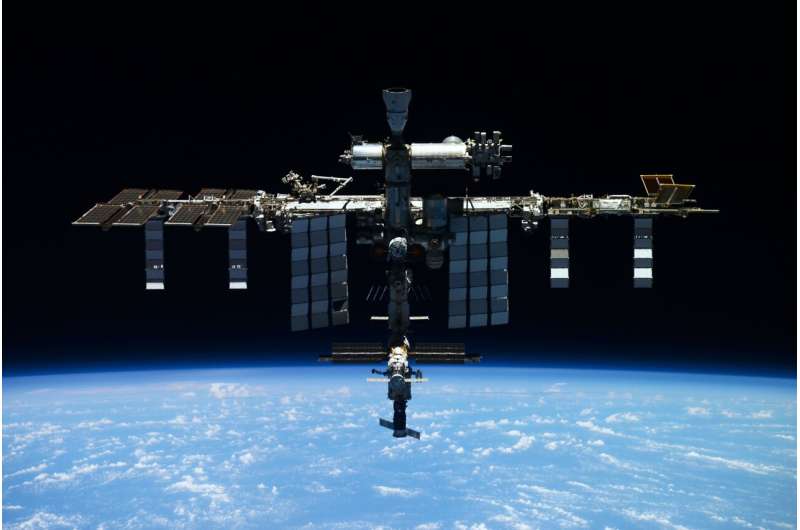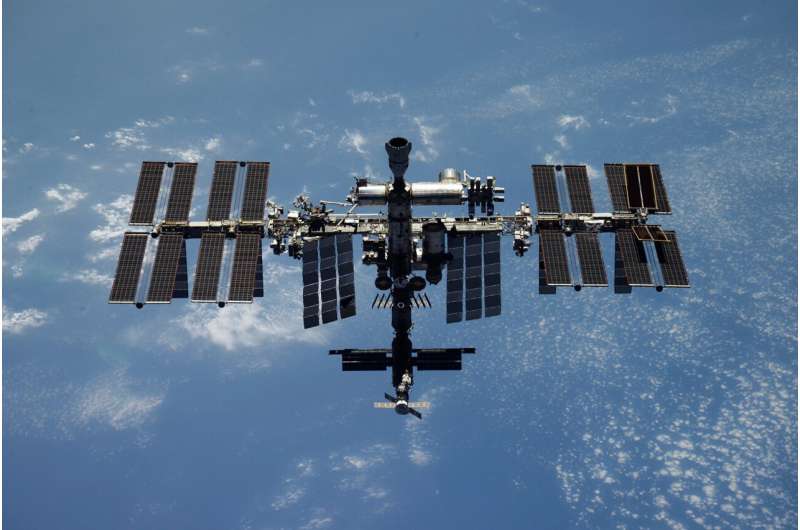A coolant leak from an uncrewed Russian provide ship docked on the Worldwide Area Station resulted from an exterior affect and never a producing flaw, Russia’s space company mentioned Tuesday.
The leak from the Progress MS-21 cargo ship was noticed on Feb. 11 and adopted an identical leak from a Soyuz crew capsule in December.
Russian space officers mentioned that December’s leak was attributable to a tiny meteoroid that left a small gap within the exterior radiator and despatched coolant spewing into space. However the brand new leak from one other ship raised doubts about that idea, and Russia’s state space company Roscosmos launched a probe into the incident to test whether or not it might have resulted from a producing defect.
NASA mentioned its specialists had been aiding their Russian counterparts within the troubleshooting of the leak.
Following checks at Russian space factories and launch amenities and an in depth inspection of the cargo ship earlier than it was dumped, Roscosmos concluded that the most recent leak resulted from an “exterior affect” much like the one which prompted December’s leak from the Soyuz crew capsule. On Tuesday. Roscosmos posted an in depth shot of the Progress MS-21 displaying a 12-millimeter (0.5-inch) gap in its exterior radiator, which it mentioned hadn’t been noticed earlier than.

After ruling out the manufacturing flaw, Roscosmos cleared the launch of a brand new Soyuz crew capsule that ought to change the broken one.
Russian Cosmonauts Sergey Prokopyev and Dmitri Petelin, and NASA astronaut Frank Rubio had been imagined to experience the Soyuz they used to reach on the station to return to Earth in March, however Russian space officers determined that larger temperatures ensuing from the coolant leak might make it harmful to make use of and it’ll return to Earth subsequent month with no crew.
Roscosmos introduced that the brand new Soyuz MS-23 capsule to interchange it will likely be launched in computerized mode on Friday and dock on the station on Sunday.
Since it’ll journey in uncrewed mode to expedite the launch, a alternative crew will now have to attend till one other Soyuz capsule is prepared, that means that Prokopyev, Petelin and Rubio must keep on the station till September, pushing their mission to shut to a 12 months.
NASA has mentioned it took half in all of the discussions and agreed with the plan.

In addition to Prokopyev, Petelin and Rubio, the space station is house to NASA astronauts Nicole Mann and Josh Cassada; Russian Anna Kikina; and Japan’s Koichi Wakata. The 4 rode up on a SpaceX capsule final October.
Roscosmos additionally introduced Tuesday that Russia will lengthen its participation within the Worldwide Area Station till 2028, reversing final 12 months’s assertion from Roscosmos chief Yuri Borisov who mentioned that Russia was planning to depart the station after 2024 and to deal with constructing its personal orbiting outpost.
The Worldwide Area Station, which has served as an emblem of post-Chilly Warfare worldwide cooperation, is now one of many final remaining areas of cooperation between Russia and the West amid the tensions over Moscow’s military action in Ukraine.
NASA and its companions hope to proceed working the Worldwide Area Station till 2030.
© 2023 The Related Press. All rights reserved. This materials is probably not printed, broadcast, rewritten or redistributed with out permission.
Quotation:
Roscosmos: Russian spacecraft leak attributable to exterior affect (2023, February 21)
retrieved 21 February 2023
from https://phys.org/information/2023-02-roscosmos-russian-spacecraft-leak-external.html
This doc is topic to copyright. Other than any honest dealing for the aim of personal research or analysis, no
half could also be reproduced with out the written permission. The content material is offered for info functions solely.




